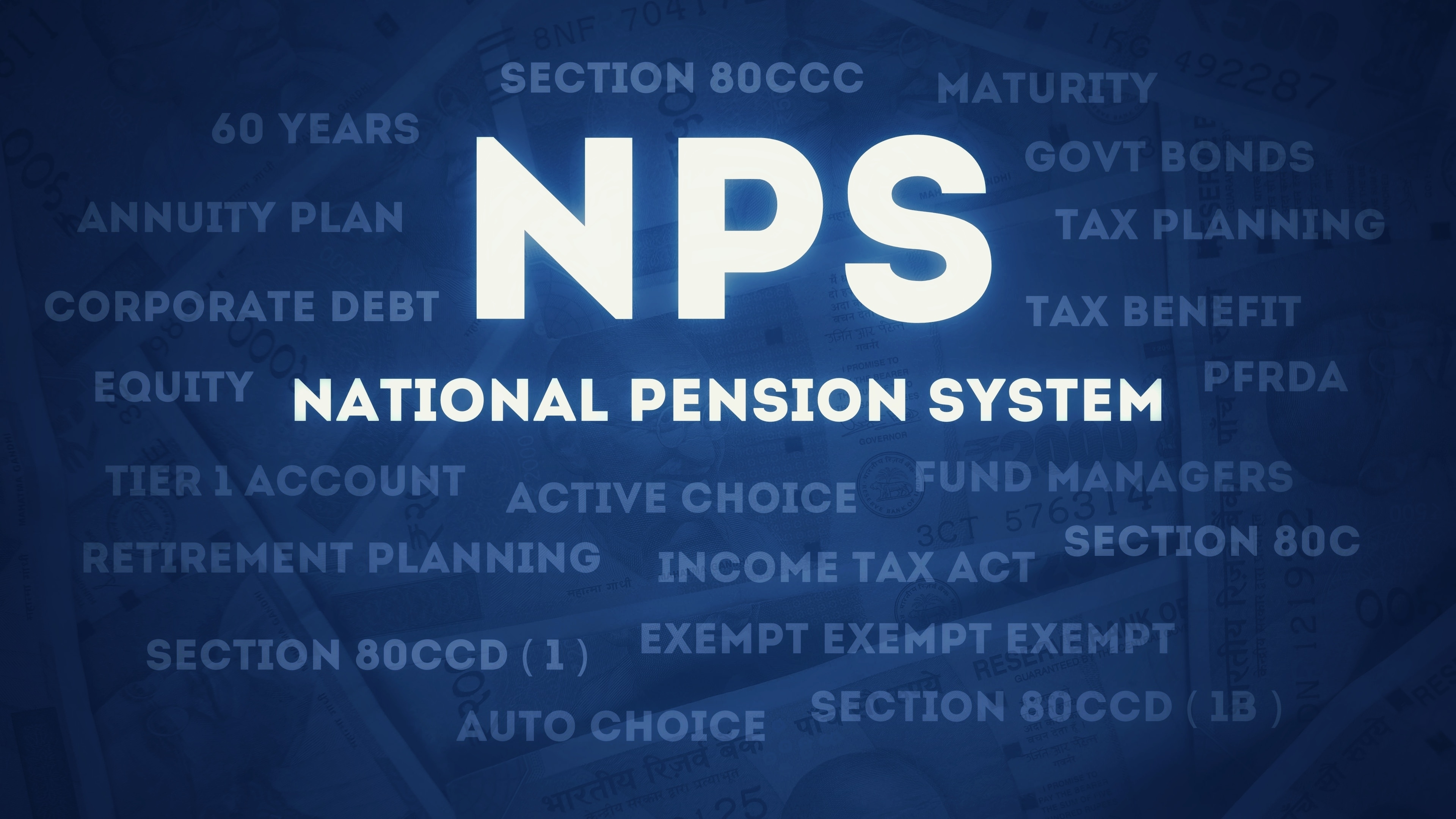Written by
Updated :
Reviewed by
The National Pension System (NPS) was originally introduced to provide a monthly pension to retired central and state government employees. Currently, NPS is available to everyone including corporate employees, other salaried individuals and even self-employed individuals. What’s more, subscribers can avail various NPS tax benefits in addition to the monthly pension that one gets at retirement. In this blog, we will discuss the tax benefits that NPS offers to investors.
NPS Tax Benefits On Self Contribution
The tax benefits of self-investment in NPS scheme extends to subscribers of all 3 models – All Citizen’s (Retail), Corporate and Government NPS. But, this benefit is available only for investments made into the NPS tier 1 account. Tax saving benefits of NPS Tier 1 account in case of Retail NPS are available under the following sections of the Income Tax Act, 1961:
1) Section 80 CCD (1)
Under this subsection, investments made into NPS Tier 1 account qualify for tax deduction of up to Rs. 1.5 lakh in a financial year as part of the overall tax saving limit u/s 80CCE of the Income Tax Act. Since, the All Citizen’s model of NPS is completely self-contribution driven, investments can be made unrestricted up to the overall 80C cumulative limit of Rs. 1.5 lakh under this subsection. However, in case of the Corporate Model and Government NPS, there are some restrictions to NPS benefits of self-investments as follows:
- For Corporate NPS Model Subscribers: Tax deduction benefit of up to 10% of salary (Basic + Dearness Allowance) can be availed u/s 80 CCD (2) not exceeding the Rs. 1.5 lakh limit in a fiscal under Section 80 CCE of the Income Tax Act, 1961.
- For Government NPS Subscribers: Contributions made by Government employees into NPS Tier 1 account are eligible for tax benefits. For State Government employees, the limit for this NPS tax benefit is 10% of salary (Basic + Dearness Allowance), while for Central Government employees this limit has been increased to 14% of salary (Basic + Dearness Allowance) as of 1st April 2019. This tax benefit is offered under Section 80 CCD (2) features a limit of Rs. 1.5 lakh in a fiscal as part of the overall 80 C limit specified by the Income Tax Act.
2) Section 80 CCD (1B)
This subsection of Section 80C of the Income Tax Act, 1961 allows Retail NPS subscribers to claim an additional deduction of Rs. 50,000 in a financial year for investments made into the NPS Tier 1 account. This is over and above the Section 80 C limit of Rs. 1.5 lakh.
Both of these sub-sections are part of the well-known Section 80C of the Income Tax Act and the combined tax deduction benefit you can obtain in a fiscal is Rs. 2 lakh. This is inclusive of the extra Rs. 50,000 tax deduction available u/s 80 CCD(1B).
NPS Tax Benefits of Investing in Tier 2 Account
While all NPS subscribers can avail the tax benefits of a Tier 1 account, only Central Government NPS subscribers are allowed to claim tax benefits for self-contributions made to a NPS Tier 2 account. This NPS tax benefit to central government employees is currently available under Section 80C of the Income Tax Act, 1961. The maximum tax deduction limit in a financial year offered in this case is up to Rs. 1.5 lakh as part of the overall 80C limit. As per existing rules, these investments have a lock-in period of 3 years.
NPS Tax Benefits for Employer Contribution
The benefit of employer contribution into NPS account is restricted to subscribers of Corporate Model and Government NPS only. In both these models, NPS tax benefits are restricted to tier 1 account contributions made by the employer. This tax benefit from employer contribution is available in addition to the tax deduction from self-contribution and in addition to the overall limit of Rs. 1.5 lakh under Section 80C. Below are the limits of the employer contribution tax benefits of NPS:
· Employer Contribution Tax Benefit for Corporate Model of NPS
Employer contributions to NPS Tier 1 account up to 10% of employee’s salary (Basic + Dearness Allowance) under the corporate NPS model qualifies for additional tax deduction. This tax deduction is offered under Section 80 CCD (2) and is over and above the Rs. 1.5 lakh limit under Section 80 CCE.
· Employer Contribution Tax Benefit under Government NPS
Government NPS offers tax deduction benefits to both state and central government employees for contributions made by the employer. Under current NPS rules, employers can contribute up to 10% of salary (Basic + Dearness Allowance) as mentioned in their salary slip in the case of state government employees.

· Employer Contribution Tax Benefit for Corporate Model of NPS
Employer contributions to NPS Tier 1 account up to 10% of employee’s salary (Basic + Dearness Allowance) under the corporate NPS model qualifies for additional tax deduction. This tax deduction is offered under Section 80 CCD (2) and is over and above the Rs. 1.5 lakh limit under Section 80 CCE.
· Employer Contribution Tax Benefit under Government NPS
Government NPS offers tax deduction benefits to both state and central government employees for contributions made by the employer. Under current NPS rules, employers can contribute up to 10% of salary (Basic + Dearness Allowance) as mentioned in their salary slip in the case of state government employees.

While maximum employee contribution can go up to 14% of salary (Basic + Dearness Allowance) in the case of Central Government employees. This tax deduction can be availed under Section 80 CCD (2) and is over and above the Rs. 1.5 lakh tax saving benefit limit in a financial year offered u/s 80 C.
NPS Tax Benefits on Withdrawals and Annuity Purchases
Current NPS tax benefits are not just limited to contributions. There are some key tax benefits that one needs to consider in the case of partial/full withdrawal as well as annuity purchase made under NPS. The following are details about these tax benefits of the National Pension System beyond Section 80C:
NPS Partial Withdrawal Tax Benefits
NPS tier 1 account provides the option of making partial withdrawals of the account balance for up to 3 times during the investment tenure subject to key terms and conditions. Such NPS partial withdrawals are tax free up to 25% of the self-contribution made by the subscriber as per Section 10(12B) of the Income Tax Act.
NPS Withdrawal Tax Benefit at Superannuation
NPS Tier 1 account is eligible for superannuation i.e. maturity after the NPS subscriber is 60 years old. Withdrawals made after superannuation can be up to 60% of the Tier 1 account balance and this amount is tax-free as per Section 10 (12A).
Tax Benefit on Annuity Purchase at Superannuation
Under current NPS rules, it is mandatory to utilize at least 40% of the NPS Tier 1 account balance for the purchase of annuities at superannuation. The purchase of annuities at superannuation in NPS is eligible for tax exemption under Section 80 CCD (5) of the Income Tax Act. However, the income obtained from these annuities is taxable as per the applicable income tax slab rate.

NPS Withdrawal Tax Benefit at Superannuation
NPS Tier 1 account is eligible for superannuation i.e. maturity after the NPS subscriber is 60 years old. Withdrawals made after superannuation can be up to 60% of the Tier 1 account balance and this amount is tax-free as per Section 10 (12A).
Tax Benefit on Annuity Purchase at Superannuation
Under current NPS rules, it is mandatory to utilize at least 40% of the NPS Tier 1 account balance for the purchase of annuities at superannuation. The purchase of annuities at superannuation in NPS is eligible for tax exemption under Section 80 CCD (5) of the Income Tax Act. However, the income obtained from these annuities is taxable as per the applicable income tax slab rate.

FAQs
Q1. Elaborate on the NPS tax benefit that a corporate NPS subscriber can avail of?
You can get a tax benefit of up to 10% of the basic salary+ DA under section 80 CCD(1) up to the cumulative Rs 1.5 lakh limit under section 80C. Also, you can avail of an additional NPS deduction benefit of Rs 50,000 under 80CCD (1B).
Q2. Is it a good idea to invest in an NPS scheme?
There are numerous NPS tax benefits offered under this scheme. Just analyze the scheme and see if it matches your risk profile and fulfils your investment goals.
Q3. How much NPS exemption in income tax can one expect to receive as an individual contributor?
Apart from Rs 1.5 lakhs, you can get an additional tax exemption of Rs 50,000 that can be claimed under Section 80CCE. Hence, you can avail a total tax benefit of Rs 2 lakh in a fiscal year.
Q4. Is the NPS scheme only limited to salaried individuals?
Anyone can avail of the NPS scheme, not just salaried individuals. Self-employed can also opt for NPS and claim tax deduction on investment under section 80CCD(1) and 80 CCD(1B).
Q5. Why is it recommended to purchase annuity in the NPS scheme?
At the time of retirement, you would have a good corpus as your retirement fund. Withdrawal of up to 60% at retirement is tax free, but will not generate long-term income. However, if you purchase annuities, you will get a regular pension for your golden years which will provide you a higher degree of financial security.
Q6. I am a salaried individual but I fall under the lowest tax bracket. Should I invest in the NPS scheme?
Though any individual can open an NPS account, it is not recommended for people falling in the lowest tax bracket from a taxation perspective. You could instead opt to invest in other options that provide returns with no or minimal withdrawal restrictions.
Sources: https://npscra.nsdl.co.in/tax-benefits-under-nps.php
https://npscra.nsdl.co.in/tax-benefits-under-nps-cg.php
https://npscra.nsdl.co.in/tax-benefits-under-nps-sg.php
https://www.livemint.com/money/personal-finance/nps-tier-ii-account-income-tax-benefits-rules-for-govt-employees-released-11597908437590.html
https://www.npstrust.org.in/content/i-want-know-tax-benefits
https://financialservices.gov.in/pension-reforms-divisions/National-Pension-System
ARN No: July22/Bg/12B




